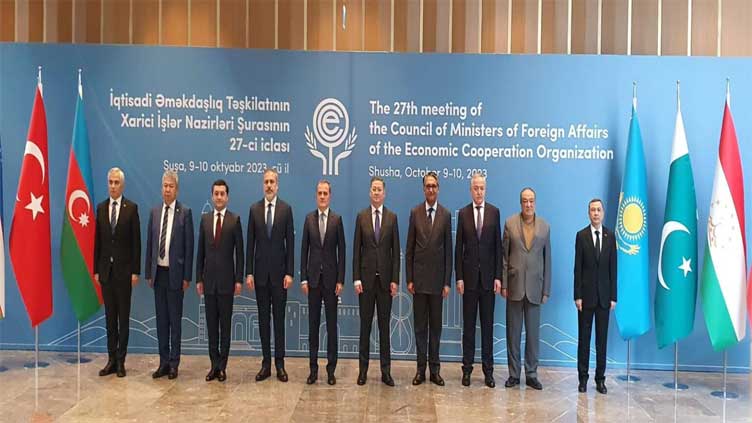The 27th session of the Council of Ministers of the 10-member ECO bloc was recently held at Shusha, the cultural capital of Azerbaijan. The Foreign Ministers of Pakistan, Iran, Turkey, Afghanistan, Azerbaijan, Kazakhstan, Kyrgyzstan, Uzbekistan, Tajikistan and Turkmenistan met at visiting resort of the Central Asian Republic and weighed the pros and cons of their three and a half decades old regional bloc that largely failed to achieve its manifesto throughout the past. The vast organizational setup including the ECO Secretariat, and multilayer mechanisms along country offices has no utility except holding periodic meetings, futile debates and actionless correspondence that could not contribute any positivity in the past decades except the expansion of the group from a three-nation party to 10 member bloc.
The Economic Cooperation Organization (ECO) is an intergovernmental body comprising 10 nations, 8 million square kilometres and half a billion people, representing 15% of the world population, and with a share of only about 2% in global trade. Meanwhile, ECO intra-regional trade is less than 8 per cent of the region’s aggregate trade and in stark contrast to other regional groupings such as the EU and ASEAN, that should a matter of concern for the member states as well as the high-ups sitting in the group Headquarters in Istanbul. Interestingly, the bloc has set its targets and anticipated goals while adopting multiple agreements to boost intra-regional trade, travel, tourism, and multilateral cooperation but all those endeavours went in vain because of certain administrative and technical hurdles together with diverging trade and economic priorities of the member nations. The 13th ECO Summit approved historic ECO Vision 2025 and adopted a landmark preferential trade arrangement between the member states aiming to lower tariffs in the region over an agreed time frame. Unfortunately, after nearly a decade, all those promises and claims are still decorative instruments without implementation or practical application.
Historically, the ECO has made trivial progress in certain areas, while it faced several challenges and limitations in pursuance of its agenda over the past years. The bloc could only achieve limited economic integration, least infrastructural development and regional connectivity, inadequate institutional capacity and high tariff barriers among the member states marred the scope for regional economic multilateralism and shared growth. Meanwhile, persistent political tension among the member nations including unceasing political instability in Afghanistan seriously restricted the regional trade and connectivity within the bloc. Similarly, the global economic dynamics and external geopolitical factors adversely influenced the success of regional economic integration of the ECO bloc, which shared multiple bonds but lacked cooperation.
In fact, the ECO is a unique mechanism which provides the neighbouring Muslim nations in South and Central Asia with a sizeable forum for regular interaction, close cooperation, and strengthening of ties in their region. It also continues to hold the promise of a bright future for our succeeding generations with an enormous geo-political significance of their region which comprises the modern-day silk route from Tashkent and Bukhara to Kabal, Lahore, Karachi, Tehran to Ankara and Izmir. The ECO member nations must realize the importance of their bloc, by weighing their strengths and assessing the reasons behind their failures. That is nothing else except a lack of will, external interventions and laxity of the leaders, otherwise, this bloc is not inferior to the European Union, ASEAN and ECOWAS, which are vigorously pursuing shared economic aspirations of the people of their region. Hence, there is a dire need for renewed efforts for an early implementation of the ECO Connectivity framework and operationalization of road and rail links that can foster transit and trade activity throughout the region. After all, destiny could only be achieved through practical endeavours instead of actionless verbosity and theorization.







